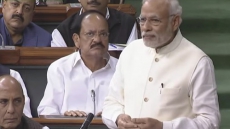The unshakeable faith of believers is evidence that the disputed site in Ayodhya was the birthplace of Lord Ram, ''Ram Lalla Virajman'', a party in the Ram Janmabhoomi-Babri Masjid case, told the Supreme Court on Wednesday.
Senior advocate K Prasaran, appearing for deity ''Ram Lalla'', told a five-judge Constitution bench headed by Chief Justice Ranjan Gogoi that the Ram Janmabhoomi has itself become personification of the deity and an object of worship for the Hindus.
He asked the court that as to how after so many centuries the proof of Lord Ram''s birth at the place can be shown.
"How can we prove after so many centuries that Lord Ram took birth at the place," said Prasaran to the bench, also comprising Justices S A Bobde, D Y Chandrachud, Ashok Bhushan and S A Nazeer.
He told the bench that Valmiki Ramayana mentions at three places that Lord Ram was born in Ayodhya.
The court then asked Prasaran if question of this nature about birth of a religious figure has ever arisen in any court.
"Whether issues like birth of Jesus Christ at Bethlehem have been questioned and dealt with by any court in the world," the bench asked Prasaran, to which the senior advocate said that he will check and inform the court.
Nirmohi Akhara, one of the leading parties in the case, has been seeking management and proprietary rights over the disputed site on various grounds including that it was under its possession since time immemorial and it has the status of ''shebaitship'' of the deity.
The court asked Nirmohi Akhara as to whether it has got any revenue records and oral evidence to establish its possession over the disputed.
The top court found that the Hindu body was ill-prepared on oral and documentary evidence to establish its claim over the site.
"Now, we are dealing with the possession. You have to establish the possession. If you have any revenue record in your favour then it is a very good piece of evidence in your favour," the bench said.
"Apart from the revenue records, what is the evidence to show, and how did you exercise the right of ''shebaitship''," the bench asked Jain, adding, "you have to establish your case".
Jain tried to establish the fact that Hindu body's lawsuit seeking re-possession of the site was not barred by the law of limitation.
"The suit is covered by Article 47 of Limitation Act 1908. The property was under attachment of Magistrate under section 145 CrPC. The limitation period starts running only after final order of the Magistrate. Since no final order was passed by the Magistrate, the cause of action was continuing and hence, no question of law suit being barred by limitation arose," Jain said.
He said that suit sought restoration of "shebait" rights for management of temple (''Shebait'' is the custodian of the temple) and ''Shebait'' rights include management and proprietary rights.
"When dispossession happened in 1950, Shebait rights got affected," he said, adding that prayer for restoration of ''shebait rights'' will be covered under recovery of possession.
"The limitation period for recovery of possession is 12 years. The dispossession happened in 1950. Suit was filed in 1959 so it is within limitation," he told the bench which was hearing the arguments in the Ayodhya case for the second day.
Nirmohi Akhara had on Tuesday strongly pitched in the Supreme Court for control and management of the entire disputed 2.77-acre land, saying Muslims had not been allowed to enter the place since 1934.
The Hindu body had said it was claiming ownership and possession of the "main temple" as also to be the manager of the birth place of Lord Rama.
The top court was told by the Hindu body that since time immemorial "Janma Asthan now commonly known as Janam Bhumi, the birth place of Lord Ram Chandra was belonging to and in possession of the Akhara".
Referring to the records, Jain had said, "No Mohammedan could or ever did enter the temple building. It was specifically stated that no Mohammedan has even attempted to enter it at least since 1934" and hence the claim of Akharara over the land was legal and should be honoured.
The court is hearing 14 appeals filed against the 2010 Allahabad High Court judgment, delivered in four civil suits, that the 2.77-acre land in Ayodhya be partitioned equally among the three parties -- the Sunni Waqf Board, the Nirmohi Akhara and Ram Lalla.
